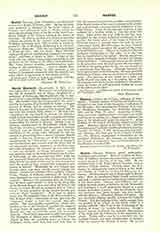

Harper, THOMAS MORTON, priest, philosopher, theologian and preacher. Born in London September 26, 1821, of Anglican parents, his father being a merchant of good means in the City; d. August 29, 1893. He was educated first at St. Paul’s School, London; then at Queen’s College, Oxford. Having taken his B.A. degree, he subsequently received orders in the Anglican Church, in which he worked for five years as a curate. His first mission was at Barnstaple in Devonshire. Here he manifested High Church proclivities and took a vigorous part in ecclesiastical controversies in the local press. Getting into collision with his bishop on some points of doctrine, he left Devonshire and purchased a small proprietary chapel in a poor district in Pimlico, London. But his ritualistic views and practices here again brought him into conflict with his diocesan—Blomfield, Bishop of London. He was obviously drifting steadily towards the Catholic Church. The final impulse came, oddly enough, from the perusal of an attack on the Jesuit Order in a volume entitled “One Year in the Noviceship of the Society of Jesus” by Andrew Steinmetz. Harper’s logical instinct discerned the intrinsic discrepancies of the book and the feebleness of the argument as a whole. Within half a year he was received into the Catholic Church, and some months later, in October, 1852, he entered the Society of Jesus. He passed through his noviceship and philosophical studies in Belgium. His four years’ theological course was divided between the English Jesuit Theological College, St. Beuno’s in Wales, Rome, and Louvain. Ordained priest in 1859, he was appointed professor of theology the following year at St. Beuno’s College. Two years later he was transferred to the chair of logic and general metaphysics at St. Mary’s Hall, Stonyhurst. A man of highly-strung nervous disposition and intense mental application, his health made frequent changes necessary. He returned after a short time to teach theology at St. Beuno’s, and subsequently worked on the mission for some years, achieving a high reputation as a preacher. During the last half-dozen years of his life he suffered from prolonged attacks of mental prostration, the malady at times assuming an acute form.
He possessed considerable powers of abstract thought, with a remarkable talent for metaphysical reasoning. Indeed, excessive subtlety impaired his efficiency both as lecturer and writer, leading him to devote disproportionate time and space to obscure ontological questions of minor significance, and consequently to leave unfinished the treatment of more important philosophical issues. A vigorous controversialist he was personally of a most amiable and childlike disposition. His chief literary works were: “Peace through the Truth, or Essays on Subjects connected with Dr. Pusey’s Eirenicon”, I (London, 1869), II (1874); “The Metaphysics of the School”, 3 vols. (London, 1879-1884). In addition to these he published several smaller works in booklet form. Amongst them were the following: “On Modern Principles”; “God the True the Good and the Beautiful”; “Manchester Dialogues”; “Lectures on Papal Infallibility“. He also wrote a series of articles on Newman’s “Gram-mar of Assent”, shortly after its appearance. But the penchant for metaphysical rather than psychological analysis which characterized Harper’s mind rendered him not very sympathetic with that remarkable work. Though possessed of considerable literary gifts he adhered to the method rather of anglicizing the scholastic terminology than translating the conceptions of the Schoolmen into the language of modern philosophical literature.
MICHAEL MAHER

